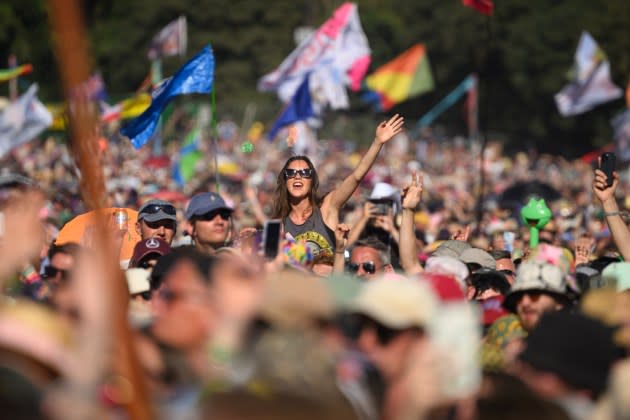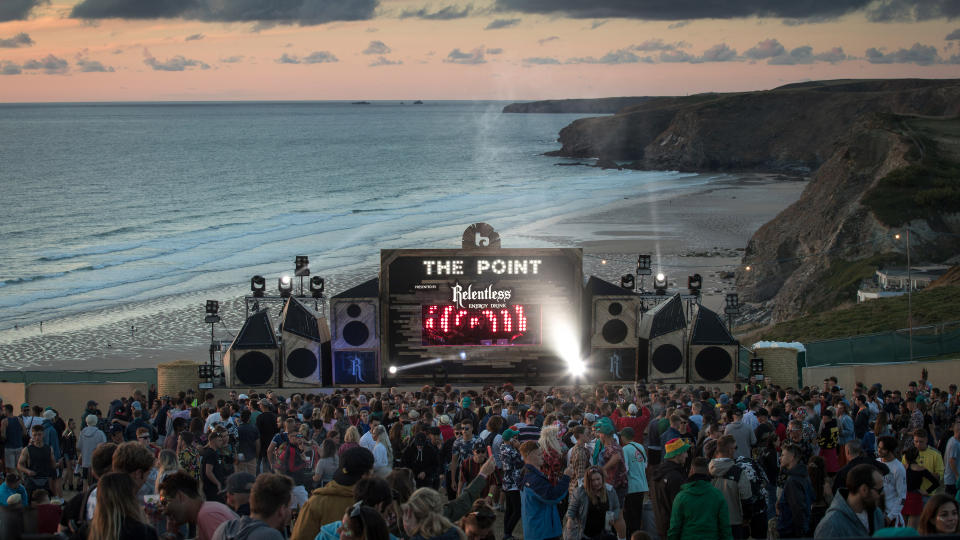Why U.K. Music Festivals Are in Crisis

The U.K.’s most prestigious festival, Glastonbury, is officially underway. Over 200,000 people will descend on the Somerset farm this weekend – but the event’s peers are facing an unprecedented crisis.
As of Wednesday, 50 independent music festivals have been canceled, postponed or announced a complete closure in 2024, according to the Association of Independent Festivals (AIF). It’s a unique problem, one that the industry has never faced before, as inflation worsens steep production costs. A few have been axed due to bad weather, but for the most part, the delayed ramifications of Brexit and the Covid-19 pandemic have created a complex credit crunch.
More from The Hollywood Reporter
Party Vibes, Scenic Views, Grand Hotels and Spas: Fun Karlovy Vary Ideas When Not Seeing Fest Films
'Under Paris' Director Used Hollywood Tricks to Make an "Anti-Hollywood" Netflix Hit
The festival industry is a delicate ecosystem, and with a decline in the U.K., there can’t be growth elsewhere according to John Rostron, the CEO of the AIF.
“Everybody else came out of Covid and immediately went back into business. If you’re running a shop or a gym, you’ve been able to adjust to this new climate every day, every week. But festivals only open for four or five days [a year]. They are not getting the time to adjust,” Rostron explains.
“Prior to the pandemic, festivals were flourishing,” he continues. When lockdown hit in 2020 there were no events, but Rostron says festival organizers “used up all the money that they had because they were still trying to stay open. They didn’t know when they were going to come back. They were trying to keep their teams on, trying to rebook acts,” despite not being able to put on an event.
By the time festivals reemerged from the pandemic in 2022, Brexit had kicked into gear. Inflation has generally risen worldwide, but when the U.K. decided to leave the European Union, barriers to exports and imports in the form of paperwork, known as non-tariff barriers, have caused delays. Food, in particular, must be signed off before entry which can cost hundreds of euros. Goods entering the country face increased charges and the trickle-down effect leaves consumers footing the bill. As well as this, Russia’s invasion of Ukraine impacted energy prices in the U.K. and a shortage of food in the pandemic drove up demand and thus, costs. In short, everything is more expensive.
Now, with the repercussions of that at their most destructive, the ticket revenue for festivals is no longer covering the production costs. And since ticket companies have also suffered through the pandemic, they are no longer advancing any money ahead of events — a standard practice pre-pandemic. Organizers are now asked to cover 100% of the cost beforehand. “It’s the worst time they’ve ever had,” Rostron says.

Crucially, these festivals are not in the deep pockets of Live Nation, a big-budget entertainment company that runs Reading and Leeds, Latitude, Wireless — some of the country’s largest and most popular music festivals. Glastonbury, which began on Worthy Farm in 1971 by private owner Michael Eavis, is an anomaly. “It’s the exception. It’s the biggest festival by far, so it’s got incredible demand,” Rostron adds.
This perfect storm leaves indie festivals floundering. Somerset’s NASS, which takes place in July and usually attracts up to 30,000, was forced to cancel in November. The bass, house, and hip-hop fest had Little Simz, Chase & Status, and Anne Marie on the bill. Many of these are run by families or local landowners with a history spanning decades. And the cancellation of smaller festivals has a ripple effect on the wider industry since the world’s biggest artists needed indie events to kickstart their careers.
“If there was just Glastonbury and nothing else, there wouldn’t be Glastonbury,” Rostron explains. “Glastonbury only exists because of everything else. You do not start playing to 100,000 people on that main stage, you work your way through. Glastonbury is a festival of festivals, and they rely on that ecosystem.”
Indeed, landing a spot on the bill at a small music festival can be the exposure an artist needs to increase their popularity and get bigger gigs. American singer-songwriter Mitski performed at Wiltshire’s End of the Road in 2019, English pop band Bastille played LeeFest in Kent a year before they released their debut album in 2012, and beloved Scottish star Lewis Capaldi headlined Gloucester’s Barn on the Farm in 2018. Fast forward five years, Capaldi performed on Glastonbury’s main stage this year. Simply put, artists — and the music industry in general — need these events to grow.
Rostron continues: “You have to headline a small stage and headline another bigger stage, because there’s a difference between being a headliner and playing on a bill. One of our members that was very early to cancel this year was Barn on the Farm. One of the stories they always tell is how Ed Sheeran headlined there for the first time in front of 5,000 people. It was important for Ed to know what it’s like to headline for 5,000 people.”
Rostron also notes that the U.K. is not alone in this crisis. The music fest crisis will have an impact on the U.S., because it has one of its legs in how well Britain is doing. “Because it’s about the skills of the individuals and the technicians as well as the talent development pipeline,” he says. “Obviously, America and the U.K. have a very strong relationship in terms of talent swapping. You can see that at Glastonbury. We have that relationship. We need both of them to have strong talent development pipelines.” Before Kesha’s debut record Animal, she performed at Lollapalooza in Chigago, as did Lady Gaga, on the fest’s smallest stage, in 2007. Global megastar Taylor Swift played Nashville’s CMA Fest in 2006 aged 17. Appearing at smaller or independent festivals can make superstars. If the U.K. isn’t developing that talent, it has a significant knock-on effect for the entire music industry.
But Rostron has one possible solution, which he is now discussing with the U.K. government and Arts Council. His team has calculated that lowering VAT, or Value Added Tax, on tickets from 20% to 5%, would be a lifesaver. If the government implemented this in 2024, a majority of these now-axed festivals would be going ahead. The issue only requires a temporary fix until festivals can adapt to a post-pandemic world and supply chains settle. They need, he says, “three strong summers” to ride out the bumps.
With Glastonbury in full swing, independent festival organizers believe it’s vital, for everyone’s sake, to invest in the industry’s grassroots events. Adds Rostron: “They’ve had four years of absolute stress and agony, and they just can’t get it over the line.”
Best of The Hollywood Reporter

 Yahoo News
Yahoo News 
